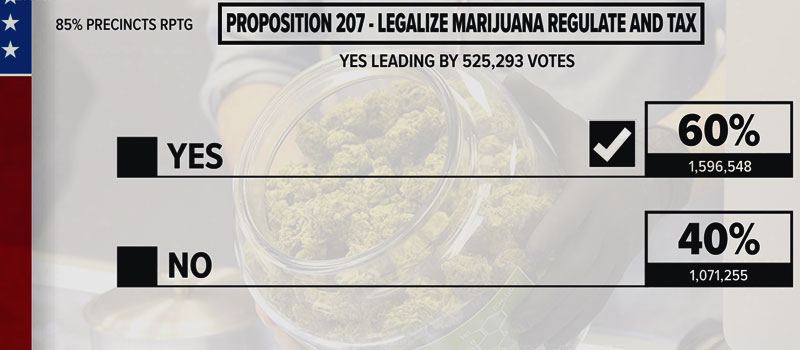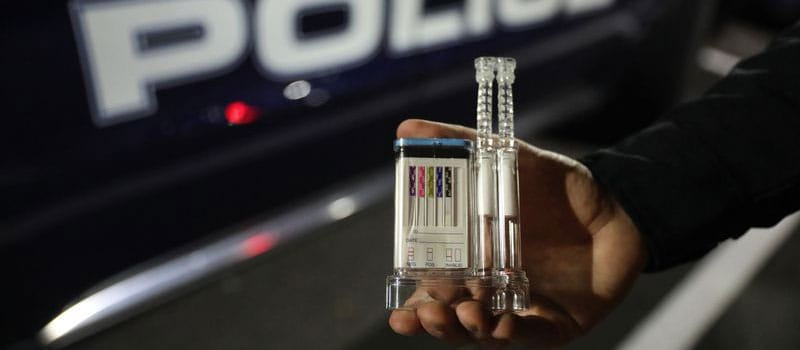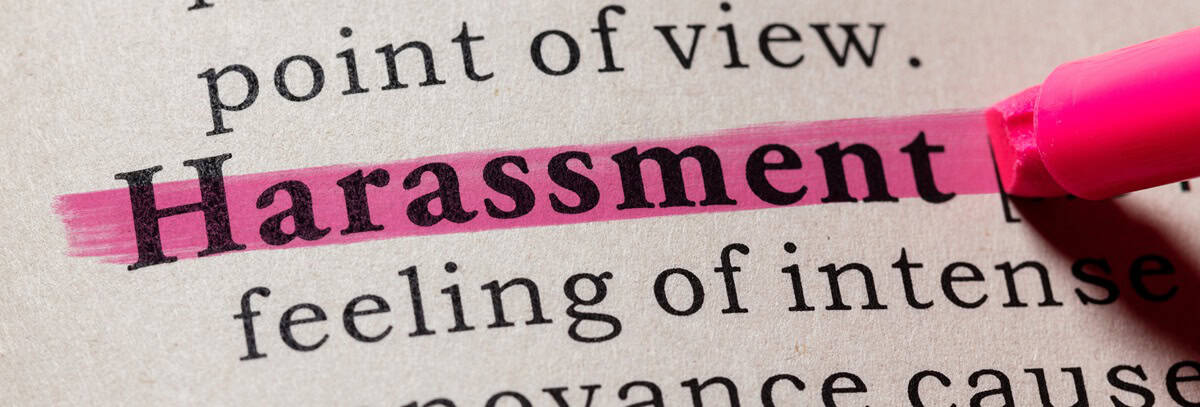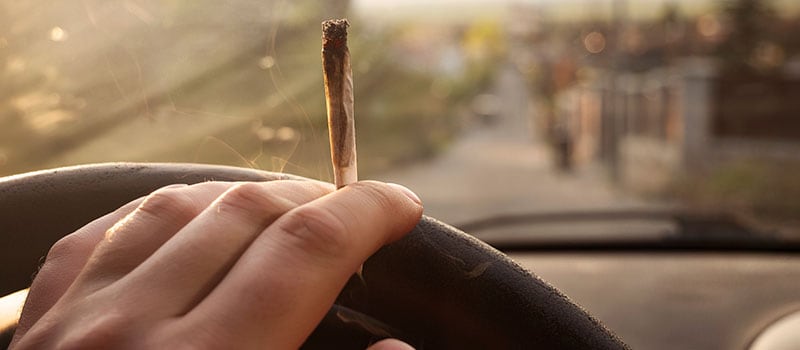The DUI statute in Arizona is found at ARS 28-1381. Under this law, there are two different ways that people can be charged with driving under the influence of drugs. Under 28-1381(A)(1), it is illegal to operate a motor vehicle while you are under the influence of any drug, alcohol, or inhalant when you are impaired to the slightest degree.
If you consume marijuana and then drive your vehicle while impaired, you can be charged with a marijuana DUI under this law, regardless if you have your MMJ Card or not.
Under ARS 28-1381(A)(3), people can be charged with a marijuana DUI when they operate motor vehicles with any drug listed in ARS 13-3401 or its metabolite. This subsection is a zero-tolerance law because you can be arrested if you have any amount of a listed drug in your system, even if you are not impaired. Marijuana is one of the listed drugs, along with heroin, cocaine, methamphetamines, and prescription drugs when you do not have a valid prescription.
While marijuana is a listed drug for a DUI charge under ARS 13-1381(A)(3), ARS 36-2852(B) specifically states that a person who has marijuana or its metabolites in their system cannot be convicted of a DUI under this subsection unless they are impaired to the slightest degree.
Speak to a Marijuana DUI Defense Lawyer Arja Shah Now
We are Open and Available to answer any questions. Free consultations by phone or video chat. Shah Law has successfully defended over 3,000 clients. We are on your side!

Arizona Proposition 207 Legalized Marijuana
On Nov. 30, 2020, Arizona voters passed Proposition 207, a ballot initiative that legalized the recreational use of marijuana in the state. This law created a new chapter in the Arizona Revised Statutes.
Adults who are ages 21 and older are now allowed to possess, use, and transport small amounts of marijuana. However, it is still possible for people to be charged with marijuana offenses if they have more than what is allowed or drive while under the influence of marijuana.
To help avoid confusion, the attorneys at Shah Law Firm have written this overview of the recreational marijuana laws and how people might still face criminal charges related to marijuana.
Proposition 207 created Chapter 28.2 of the Arizona Revised Statutes. Under ARS 36-2852, adults who are 21 or older may now lawfully do the following things:
- Possess, transport, consume, manufacture, process, or purchase up to one ounce of marijuana or five grams of marijuana concentrate
- Possess, transport, cultivate or process up to six marijuana plants per individual or a maximum of 12 plants in a single residence for two or more adults
- Cultivation at home when the plants are contained in a locked closet, room, or greenhouse in which the plants are not visible to the public
- Transfer up to one ounce of marijuana or up to five grams of marijuana concentrate to another adult without pay
- Transfer up to six plants to another adult without pay
- Possess, purchase, or acquire marijuana paraphernalia
Previously, possession or use of up to two pounds of marijuana in Arizona was punishable as a class 6 felony under ARS 13-3405. Under the new recreational marijuana law, however, adults who possess or use one or fewer ounces of marijuana cannot be criminally charged.
If you are caught with more than 2.5 ounces of marijuana, more than 12.5 grams of marijuana concentrate, or are caught selling marijuana without a license, you can still face severe charges in Arizona. Possession of more than one ounce of marijuana up to 2.5 ounces is now a petty offense, but possession of larger amounts can still be prosecuted as a felony.
If you are younger than age 21, you can also face criminal charges if you use, possess, sell, cultivate, or transport marijuana.
Under ARS 36-2851, employers can still prohibit the use of marijuana on their property. People also cannot drive while under the influence of marijuana when they are impaired to the slightest degree. Public consumption of marijuana is also prohibited.

What Happens During a DUI Stop?
While it is now legal for adults over the age of 21 to use marijuana, you can still be arrested and charged for a marijuana DUI. If an officer pulls you over and suspects that you are impaired, he or she can complete a DUI investigation. Police officers who see people commit different driving infractions can pull them over and subsequently develop a reasonable suspicion that they might be impaired and begin a marijuana DUI investigation.
An officer that sees certain types of poor driving might also pull someone over on suspicion that they are driving while impaired.
For example, if an officer sees you weaving, driving too slow, speeding, or driving erratically, he or she might suspect that you are under the influence of drugs or alcohol.
From the time an officer approaches your vehicle, he or she will be making observations to look for signs of impairment. These might include actual physical control of the vehicle, bloodshot, watery eyes, odors on your breath or in your vehicle, slurred speech, slowed motor movements, and others.
Some of the indicators police officers look for to charge people with a marijuana DUI while impaired to the slightest degree by marijuana include the following:
- Statements admitting to using marijuana
- Bloodshot eyes
- Odor of marijuana
- Marijuana paraphernalia in plain sight from outside of the vehicle
- Slowed reaction time
- Inability to concentrate
- Poor eye-hand coordination
- Reduced perception of distance and time
The officer might ask you to step out of your car and perform the standardized field sobriety tests. These are the roadside tests that you might see on television programs. While the officer might ask you to perform these tests in a way that makes you think that you must comply, you are not required to perform the field sobriety tests, also known as SFSTs. It is best for you to politely decline.

If the officer thinks that you might be under the influence of marijuana or another drug, he or she will call a drug recognition expert or DRE to the scene. This is an officer who has undergone training to recognize the signs of drug impairment. This officer might perform some other tests.
Finally, if the officer believes that he or she has developed enough probable cause to arrest you for a DUI, you will be taken into custody. You will then be asked to provide a blood sample. The sample will be sent to a lab for testing. Police officers must secure a warrant to take a blood sample. You also have the right to request an independent blood test of your own!
Blood tests are used for marijuana DUI and other drugs DUIs because a breath test will not reveal the concentration of drugs in your system like the breathalyzer test does for alcohol.
Arizona does not have a specific level of marijuana that is considered to be impairing. This can work against you as there is no minimum threshold.
By contrast, the limit for alcohol is 0.08%. What the police will be looking for in your blood test is the presence of Delta-9 THC. This is the psychoactive component of marijuana that can cause impairment.
Once this component is metabolized by your body, it will no longer be active. However, if your blood shows the presence of Delta-9 THC, the police might charge you with a DUI if they believe you were impaired to the slightest degree.
What to Watch: Arizona HB 2084
Arizona does not have a per se limit for marijuana, yet. However, other states do. For example, Colorado has a per se limit for Delta-9 THC of 5 ng/ml. A driver that has this amount of THC in their blood in Colorado will have an inference created that they are impaired.
State Representative John Kavanaugh introduced HB 2084 on Jan. 11, 2021. Since passed, this bill would establish a per se limit for THC of 2 ng/ml. This is an extremely low concentration of THC, and many users who are not impaired may have levels of THC that exceed this low limit.
You could be found guilty of a Marijuana DUI if you are found to have 2 ng/ml of Delta-9 THC in your blood within two hours of operating a motor vehicle, even if you are not impaired.
However, per se laws are arbitrary since there are no definitive studies showing what concentration of THC is impairing, and the amount can vary based on many different factors, including the following:
- How often do you use marijuana
- Whether you have eaten anything
- How you ingested marijuana
- The marijuana’s strength and strain
- Your individual biochemistry
Another problem is that marijuana can remain in your system for up to a month. You might test positive for THC long after you used it and not be impaired.

What Proposition 207 Did not Legalize?
Even though recreational marijuana is now legal, you can still face marijuana charges if you commit certain offenses. For example, if you possess more than one ounce of marijuana, you can be charged with a crime. While you can legally transfer or give away a small amount of marijuana to someone else, you cannot sell marijuana under this law.
Selling marijuana without a license is still a felony and could result in a long prison sentence.
Similarly, cultivating more than the allowed number of marijuana plants can also result in charges. Finally, it’s important to note that marijuana remains illegal under federal law. However, the federal government has not prioritized prosecuting low-level federal marijuana offenses for possession or use of marijuana.
Expungement / Set Aside of Marijuana DUI Convictions
People who were previously convicted of low-level marijuana offenses will be able to petition the court for a set aside (also referred to as expungement) of their records beginning on July 12, 2021. Marijuana expungement means that the records related to the marijuana DUI conviction would be removed from your record.
A set aside means that you have completed any sentencing/punishments and have paid fines and fees. Technically, you will still have a criminal record, but the courts have ruled in your favor to set aside any judgment of guilt. Employers, landlords, and others who check your background would no longer see any record of your past marijuana DUI conviction.
You will be able to petition for a marijuana set aside of the following types of conviction records:
- Possession, use, or transportation of 2 1/2 ounces or less of marijuana
- Possession, transportation, or cultivation of up to six marijuana plants
- Possession, transportation, or use of marijuana paraphernalia
If you have a past marijuana conviction on your record, you should talk to the attorneys at Shah Law Firm about seeking an expungement.
Get Help from Shah Law Firm to fight a Marijuana DUI Charge
If you are facing any type of marijuana charge or a marijuana DUI, you should talk to the experienced criminal defense lawyers at Shah Law Firm.
We can review your case and help you to understand the legal options and defenses that might be available to you. Call us today at (602) 560-7408.











